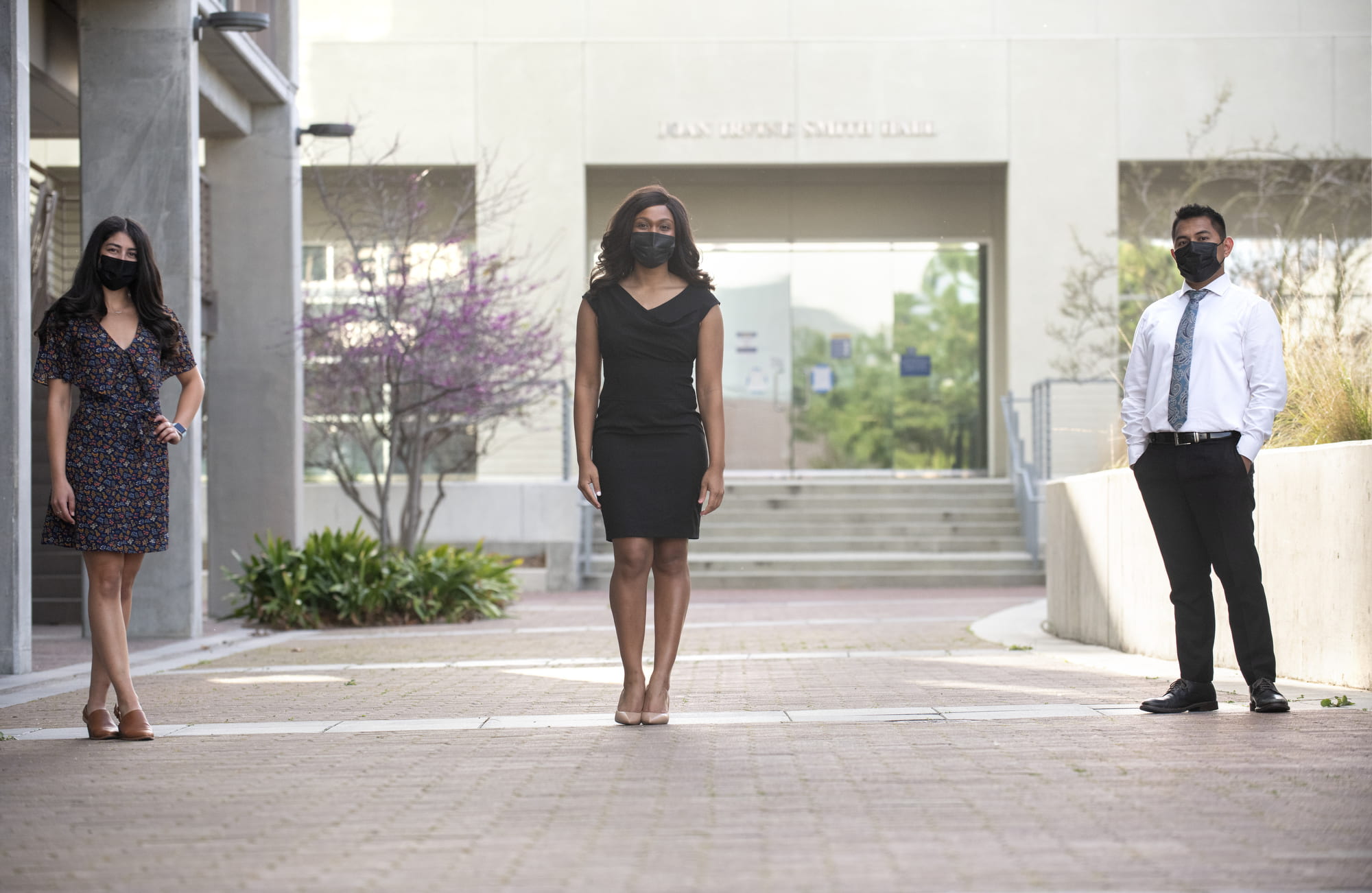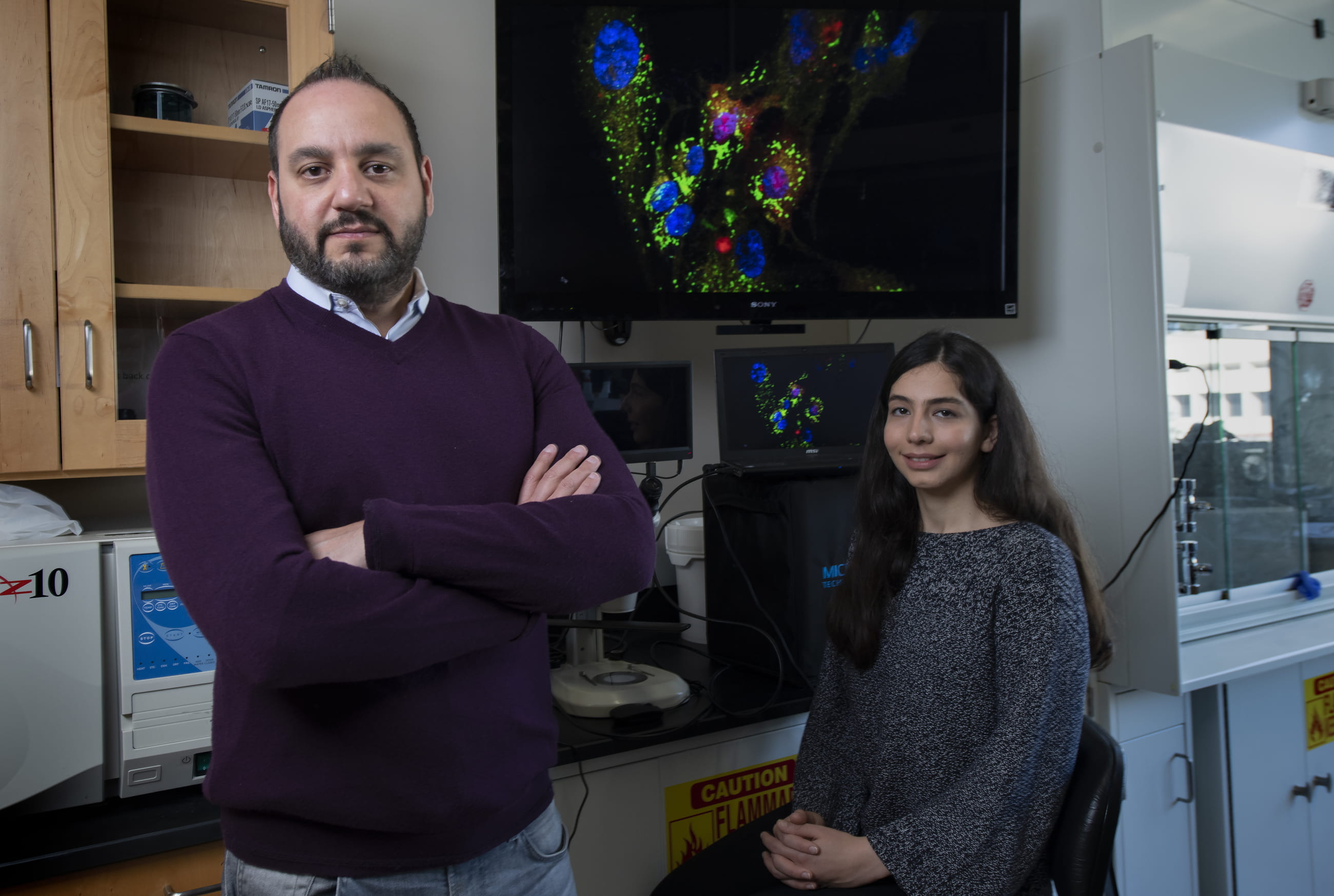For UCI’s med students, the future is now with Match Day
We highlight three graduating medical students who have excelled despite unprecedented challenges

On Friday, March 19, graduating medical students across the country will find out which residency program they’ve been “matched” with. Annual Match Day ceremonies promise high emotion, even when virtual. At UCI, more than 100 future physicians learned where they’ll start their careers after earning M.D.s in May.
The class spent the final year of medical school in a pandemic. For some, this limited which specialties they could study or meant they had to find creative ways to gain experience in their chosen fields. Others took the opportunity to discover new types of healthcare, such as telemedicine. All have had limited physical interaction with mentors, fellow students, patients, friends and family and have had to rely on novel methods of support while acting as role models for safe practices in their communities.
Many students have taken the peculiar situation in stride and accomplished great things during their time at UCI, overcoming challenges that no previous class has faced. These are three of them.
Making sure Black lives matter in medicine
Kaosoluchi Enendu started her medical education early. “My mom is a nurse,” she says. “And she was a single mom, so I was often at the hospital with her.”
At age 13, Enendu began volunteering while her mother was on the job. “People started paging me because they knew I enjoyed running around and helping,” she says. “And my mom would jokingly remind them, ‘My daughter doesn’t work for you!’”
But years of hospital experience didn’t make medical school easy for the student, who is first-generation Nigerian American and grew up in Fairfield, California.
“I don’t see many Black students in medicine, especially not in Southern California,” Enendu says. She chose UCI for medical school because of the people she connected with as an undergraduate at the university. She earned a bachelor’s degree in biological sciences in 2016.
“The UCI Black community is small but mighty,” she says. “I thought, ‘If I’m going to go into this stressful time in my life, let me go where I feel supported and have roots.’”
Enendu helped that community grow by co-founding Leadership Education to Advance Diversity – African, Black and Caribbean in 2019 with Dr. Carol Major, assistant dean of diversity and inclusion in UCI’s School of Medicine, and Dr. Khanh-Van Le-Bucklin, the school’s vice dean of medical education.
LEAD-ABC is the first medical school program in the United States designed to develop leaders in medicine who will serve African, Black and Caribbean people.
Enendu got the idea for the program when she entered medical school. She wrote a proposal; gained support from Major, Le-Bucklin and Terrance Mayes, then UCI Health’s chief diversity officer; and recruited Dr. Candice Taylor Lucas as co-director. Enendu says she was “unyielding” in pushing LEAD-ABC development forward because she “saw such a need.”
“If it wasn’t for Kaosoluchi, I’m not sure it would have taken off as fast as it did,” Major told the UCI Podcast in July 2020. The UCI medical school’s class of 2020 graduated without any Black students, but the cohort that entered three months later had a record 12.
As a doctor, Enendu hopes to address health inequities, focusing on racial trauma – stress stemming from the experience of racial discrimination. She plans to treat patients holistically, taking their racial and social context into consideration. Eventually, Enendu would like to advise institutions on how to do this on a larger scale and consult on the creation of other mission-based programs like LEAD-ABC around the country.
“I want to partner with patients and provide care with an anti-racism lens,” she says, “and give other doctors the tools to do the same.”
The next step of Enendu’s journal begins at Yale University, where she will join the residency program in psychiatry.
Treating the whole patient
Ariana Naaseh always wanted to be a doctor, but an intense struggle with adult acne showed her the value of physicians who care about mental and emotional as well as physical health.
“It took me a long time to find someone that I felt comfortable with. Ultimately, I found a doctor who not only cared about treating my condition, but also heavily considered how acne affected me, my relationships and my experience as a college student,” she says. “I realized that I wanted to take the extra time to make my future patients feel like they were valued as people first.”
Naaseh, who is from Irvine and intends to go into general surgery, hopes to provide emotional as well as medical support to patients entering what is often a scary, unexpected and challenging time in their lives.
“I believe it’s a very special privilege to be able to connect with someone in what I see as their most vulnerable moments, to talk through all their options and make them feel comfortable with our path forward,” she adds.
Learning how to treat the whole person was one of the key reasons Naaseh chose UCI for medical school after earning a B.A. in cognitive science at UC Berkeley. “Each week our education emphasized how we could best show patients empathy and that we care,” she says.
Naaseh gained experience improving the lives of her fellow students as co-class president her first three years and as co-student body president her final year. Her biggest accomplishments, she says, were reforming the school’s pace to better suit students and planning events that fostered a sense of community among all students. Naaseh is most proud of helping to institute the curricular, financial and structural changes that promote mental health during board exam study periods and difficult clinical clerkships.
“Those stick out to me as things that, hopefully, will have long-lasting benefits for UCI students to come,” she says.
Naaseh will be joining the general surgery residency program at Washington University-St. Louis.
Giving back
Growing up in Long Beach, Alfonso Ortiz Cruz stepped into healthcare at a young age. “My parents are undocumented,” he says. “They tried their best to navigate the complex medical system, but low health literacy was an enormous barrier, and there were countless instances where I had to take the reins.”
Those early experiences showed him how big an impact cultural context can have for a patient, and Ortiz Cruz has let that knowledge inform his work with the UC Irvine Outreach Clinics, a student-led organization that provides medical care to Orange County residents with limited access to health services.
“There is an immediate bond created when I introduce myself to the patient in Spanish – a deeper understanding,” he says.
Ortiz Cruz earned a bachelor’s degree in public health sciences at UCI in 2014 before entering medical school at the university. He’s in the Program in Medical Education for the Latino Community, a five-year M.D./master’s program that trains physicians to be leaders in their fields and meet the needs of Latino communities.
Throughout his 10 years at UCI, he has contributed to UCIOC’s growth. The clinics now offer family medicine, cardiology, dermatology and dental services, and medical students can rotate through to obtain credit.
“It’s been an absolute pleasure to watch this clinic blossom,” Ortiz Cruz says. “I’m excited to see where this new generation of student leaders takes the organization.”
As a queer person of color, he also appreciates that his medical education included practicing consultations with patients from a wide variety of communities – including LGBTQ – in a controlled setting.
“These sessions allowed me to become more proficient in addressing a patient with dignity and respect,” says Ortiz Cruz, who’s will be joining the psychiatry residency program at UC San Francisco and plans to continue to use his cultural and language skills to serve patients from diverse backgrounds.
He’s also committed to giving back to his mother and father, who, he says, have made his academic journey possible. Ortiz Cruz has joined the U.S. Army to help provide his parents a pathway to citizenship and will start his residency as a physician with the rank of captain.
“They’ve given me the world and have showered me with endless love and support,” he says. “This is the least I can do.”


